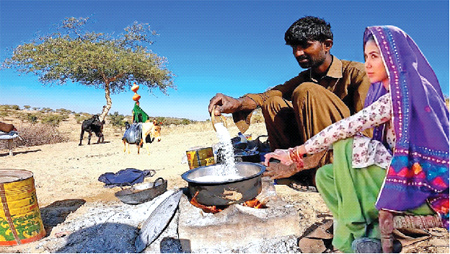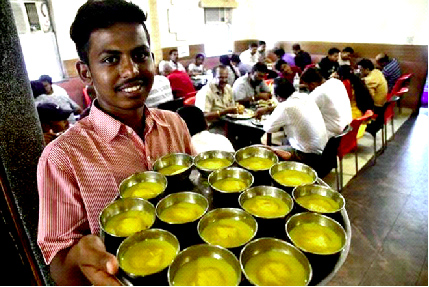When we have gone global in various aspects, why can’t we also go global in our food choices? This question sounds valid to many, but have we checked the impact of globalisation on our food culture? A mindless change in our food habits somewhat sidelined our health, culinary art, and biodiversity in agriculture for being modern.
Food preparations evolved over centuries are developed and based on our reaction to the chemicals or nutrients present in the foods. Eating food or choice of food is more of a science than an art. Knowing this science and using local agricultural produce, cookery was developed by our ancestors to promote health and economy.
Traditional Food Scores Over Western Diet
The energy we consume through proximate principles comprises carbohydrates, proteins and fats. Our body receives varieties of carbohydrates through many kinds of cereals, such as rice, wheat, jowar, ragi, and many more millets; proteins through various types of dicots, milk and its products, eggs, and meat; and fats through different oils, ghee, and butter are part of our daily meals. The ratio of these three essential nutrients is perfectly balanced in our traditional cooking and are undoubted to meet our energy demands. Adding Pizza, Burgers, Energy Bars, and Chocolates will alter the carbs, protein, and fat ratio, which dents healthy calorie consumption.
Incorrect Projection by MNCs
Traditional cooking like Idli with Sambar, Dokhla with Mint Chutney, various Rotis with Dal, Rice with Sambar, Poha with Ground Nuts, Dosa with Chutney, etc., are comprised of all the three major nutrients while promote growth, protection from infectious diseases, and supplies healthy energy to perform all kinds of activities. In addition, all our cooked foods loaded with seasonal vegetables will look into the need for calcium, iron, phosphorus, iodine, and other minerals. For instance, a person staying away from towns and cities, where outside vegetables are not supplied and have limited choices, is not deprived of the nutrients. The general assumption is that these people are not eating enough healthy foods because the foods they eat are unfamiliar and do not match world standards. Generalising the food values based on global food culture threatens local cuisine. Therefore, we must stop evaluating the nutritional values of daily meals based on what is available in international markets. In addition, multinationals with mass production capacity have come with a bang projecting packaged breakfast cereals are healthier than Poha and Daliya. This has severely affected our local food habits.
We must stop evaluating the nutritional values of daily meals based on what is available in international markets. In addition, multinationals with mass production capacity have come with a bang projecting packaged breakfast cereals are healthier than Poha and Daliya. This has severely affected our local food habits
Local Food Keeps Us Healthy
A place called Gondar, a remote village situated in Kedar reserved forest, is rich in biodiversity and adds umpteen numbers of edible vegetation to the local villagers’ cooking. Similarly, villages dotted on the banks of river Narmada, and villagers near the Thar Desert use unique vegetables that are unfamiliar to markets of other big towns. These strange foods are assets in keeping us healthy as they are rich in bioactive components.
As a dietician, I evaluate the food I enjoy during my regular travel to the remote Himalayan regions and other unknown places, suggesting that none of these people are deprived of major nutrients. I want to share my experiences – in a village called Kuti, situated at 14,000 ft in the Kumaon region of the Himalayas near Tibet. I had Sillikura with Cholayi Subji (green leafy vegetable) for my breakfast there. It is a kind of Dosa, and the batter was thoroughly mixed and churned out in wooden vessels and heated on a pan using the Boj Vrksh Raakh (ash). The sweet taste with a mild aroma of Boj Vruksh enhanced my hunger. I had enough to sustain me to trek to Adi Kailash. When I enquired an older man, head of the village, about infant and maternal mortality, he laughed at me to say, if a woman becomes pregnant, the family is sure of having a healthy baby. He continued to say that none in their village suffered from diabetes, hypertension, and obesity. It was true that women climbed steep mountains at ease with loads, did Kethbody (farming), and worked hard while singing melodies, and men with loads walked for kilometres to do trading.
Indian foods, irrespective of where one lives, consist of cereals, millets, a dicot, green leaves with vegetables, milk and its preparations, vegetable oils, animal fat, eggs, and meat. These foods contribute energy, healthy carbohydrates, protein, minerals, vitamins, and hundreds of bioactive substances to postpone degenerative disorders and detox the body. When these foods undoubtedly take care of our health, there is no need to change to other strange foods such as Olive Oil, Canola, Kinova, Apple Cider, Brussel Sprouts, etc., for health reasons. The point is that the market is driven by the global economy. As a result, international foods are pushed in place of indigenous foods affecting our food culture at the cost of our health and purse.

of other big towns
A popular journal of economics wrote how new-generation foods like probiotics and prebiotic foods helped the economic growth of the food industry and missed the health aspects and commoner’s purse.
Probiotic familiar with Bharatiyas
Let us look at how these new-generation foods, such as probiotic foods, affect our rich food culture and thereby damage our ancient science of cooking. The new-age foods flooded the market, luring the clinicians to recommend them to the public. The word probiotic may be new, but the concept is not unique to us. It is to say; we have umpteen probiotic-rich foods using them daily in Indian households. Commonly used probiotic foods are homemade curds, Dhokla, Idli, and Dosa take care of our gut health by balancing bacterial flora. Still, unfortunately, we think Idli and Dosa are only for taste and opt for marketed probiotic foods for health reasons. Idli, Dosa, homemade curds, etc., are not only tasty and low-cost but also imbibed in our culture. We know how to prepare them by heart and have been using them in our meals for aeons. So, effortlessly we cook them in our homes. Our age-old fermented foods’ probiotic quality has taken backstage before these new generation marketed products by damaging the Aatmanirbharata of Indians.
Idli, Dosa, homemade curds, etc., are not only tasty and low-cost but also imbibed in our culture. We know how to prepare them by heart and have been using them in our meals for aeons. So, effortlessly we cook them in our homes. Our age-old fermented foods’ probiotic quality has taken backstage before these new generation marketed products by damaging the Aatmanirbharata of Indians
Tetra packaged milk is supposed to be taken without boiling, highlighting that boiling milk through the conventional method destroys Vitamin C. The product is pushed in the name of conserving Vitamin C. But the fact is that Vitamin C is abundant in nature, and it is rare to see Vitamin C disorder. Indians know how to restore Vitamin C in their foods by using raw greens and sprouts in the form of Chutney and Kosambari (salad). So, encourage people to eat traditional cuisine to have this vitamin. We Indians boil milk and add starter to leftover milk to make curds. Later, curd-based foods like Majjige Huli, Kadi, Rava Idli, Mosaravlakki, Buttermilk, and many more may vanish slowly, as there are no leftover sour curds at home. Functional foods are the concept of new global food culture engulfing traditional food habits. Traditional foods have many more biological functions than new-aged foods with only a few qualities. However, we can assume that changing traditional food culture to a global food culture stares at us with nutritional imbalance. It is needless to say, transforming our local food practices to international ones will affect our Aatmanirbharatha, and ultimately we lean on others for food supply.
Our eating habits, choice of foods, local agricultural practices, and its produce all go hand-in-hand. Any change will affect our farming, thereby our farmers. The farm produce of other countries is making a significant way in our food choices. In India, we are growing varieties of millets that will be replaced by millets from other countries. Supposedly, we change our eating practices to match the international food culture; our farmers face physical and financial hardship. If local foods like ragi, foxtail millet, etc., are pushed to the corner, they will struggle to survive without patronage. They have evolved over centuries and will vanish, reducing the capacity to support biodiversity. In other words, more and more farmers are moving beyond indigenous crops for short-term gains. This change is affecting our food culture. Mindless aping of global cultures is obliterating our heritage, cultural symbols, and ethnic identities. The time has come to revive our links with our health, economy, and food culture.




















Comments